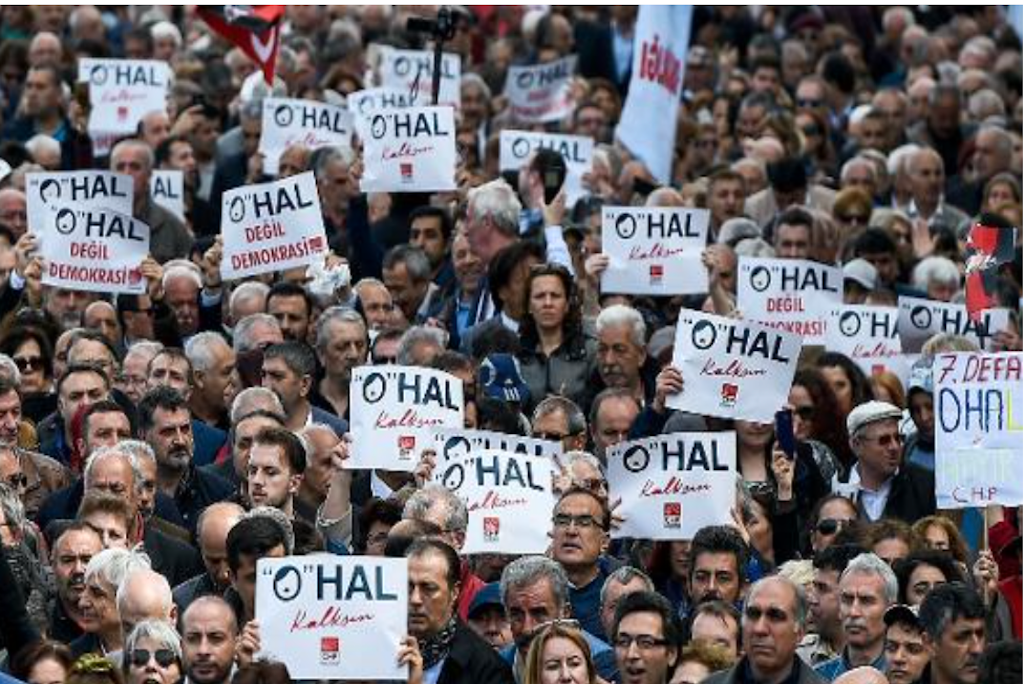The US State Department has stated that a continuing state of emergency in Turkey, imposed following a July 2016 coup attempt, had far-reaching effects on the country’s society and institutions in 2017, restricting the exercise of many fundamental freedoms.
Turkey’s state of emergency was extended on Wednesday by three months for the seventh time as the Turkish Parliament passed a bill presented by the Justice and Development Party (AKP) government, which is under the strict rule of President Recep Tayyip Erdoğan.
The state of emergency was first imposed by the Turkish government after a controversial coup attempt on July 15, 2016 and was extended on Oct. 19, 2016, Jan.19, 2017, April 19, 2017, July 20, 2017, Oct. 17, 2017 and Jan. 18, 2018.
The State Department released its 64-page Turkey 2017 Human Rights Report on Friday. Reminding that by year’s end Turkish authorities had dismissed or suspended more than 100,000 civil servants from their jobs, the report stated that the government arrested or imprisoned more than 50,000 citizens and closed more than 1,500 nongovernmental organizations (NGOs) on terrorism-related grounds since the coup attempt, primarily for alleged ties to Turkish Muslim scholar Fethullah Gülen and his movement.
According to the US human rights report, the most significant human rights issues included alleged torture of detainees in official custody; allegations of forced disappearance; arbitrary arrest and detention under the state of emergency of tens of thousands, including members of parliament and two Turkish-national employees of the US Mission to Turkey, for alleged ties to terrorist groups or peaceful legitimate speech; executive interference with independence of the judiciary, affecting the right to a fair trial and due process; political prisoners, including numerous elected officials; severe restriction of freedoms of expression and media, including imprisonment of scores of journalists, closing media outlets, and criminalisation of criticism of government policies or officials; blocking websites and content; severe restriction of freedoms of assembly and association; interference with freedom of movement; and incidents of violence against LGBTI persons and other minorities.
The report said the Turkish government continued to take limited steps to investigate, prosecute and punish members of the security forces and other officials accused of human rights abuses and that impunity for such abuses was a problem.
According to the report, clashes between security forces and the Kurdistan Workers’ Party (PKK) terrorist organization and its affiliates continued throughout the year, although at a reduced level from 2016, and resulted in the injury or deaths of security forces, PKK terrorists and an unknown number of civilians. The government declined to provide information on efforts to investigate or prosecute personnel for any wrongful or inadvertent deaths of civilians linked to counter-PKK security operations.
Turkey survived a controversial military coup attempt on July 15, 2016 that killed 249 people. Immediately after the putsch, the Justice and Development Party (AKP) government along with President Recep Tayyip Erdoğan pinned the blame on the Gülen movement.
Fethullah Gülen, who inspired the movement, strongly denied having any role in the failed coup and called for an international investigation into it, but President Erdoğan — calling the coup attempt “a gift from God” — and the government initiated a widespread purge aimed at cleansing sympathizers of the movement from within state institutions, dehumanizing its popular figures and putting them in custody.
Turkey has suspended or dismissed more than 150,000 judges, teachers, police and civil servants since July 15. On December 13, 2017 the Justice Ministry announced that 169,013 people have been the subject of legal proceedings on coup charges since the failed coup.
Turkish Interior Minister Süleyman Soylu announced on April 18, 2018 that the Turkish government had jailed 77,081 people between July 15, 2016 and April 11, 2018 over alleged links to the Gülen movement.
















